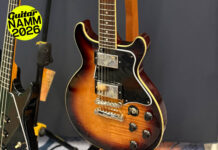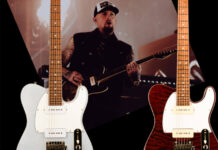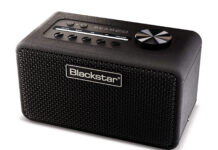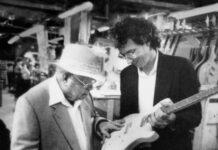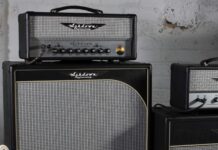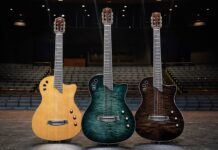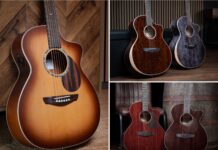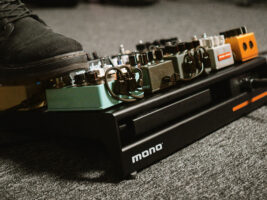
“It’s really important for guitarists to have something identifiable about the way they sound. In 2025 that’s getting lost”: Where can’t amp modellers compete with physical pedalboards? UK math rock guitarist weighs in
Floorboard amp modellers have sure made touring easier for a growing number of artists, but are they impacting our identities as players?
The small yet mighty power of gear like the Neural DSP Quad Cortex means bands no longer need to transport heavy and somewhat fragile gear across borders, but can rather chuck all the tones they need quite literally into a backpack. But without physical pedals and real life amplifiers, some artists are concerned that sonic identity and uniqueness could slowly fade away.
READ MORE: Brian Wampler likens the rise of amp modellers to Napster’s impact on music: “I think it’s going to take a big chunk of the market”
This is a concern recently raised by Tom Peters of UK-based math rock band, Alpha Male Tea Party. In an interview with Guitar World, Peters likens the modeller’s impact on the creation and performance of music to Spotify’s vast effect on how we listen to it.
“Why do I insist on a massive physical board when modellers exist? Well, one, I’m quite stubborn; and two, I feel it’s really, really really important for musicians in bands to have something identifiable about the way they sound and what they do. And in 2025 that’s getting lost,” he explains.
“The heart of my board is the Boss ES-8 switching system. I used to hate doing all the tap dancing, so I’ve got a bunch of pedals set up on MIDI – you can look at it and say, ‘This is complex,’ but anyone with a Quad Cortex or your basic laptop freebie has more options in the box than I do on my board.
“For me, modellers are a bit like Spotify. I don’t connect with music in the same way I did when I went to a store to buy a CD. Back then I’d wilfully choose to buy something and add it to my collection. Spotify gives you all the music in the world, ever. People listen to it and go, ‘That’s a great record’ – and then move on to another one. Within two weeks of an album cycle people have moved on.”
To clarify, Peters doesn’t judge or shame anyone for using modellers, and notes that they do indeed work very well, “But I don’t think I’d ever get that excited about having a box that has literally every single tone in it, because I haven’t worked to get them,” he continues.
“Another thing we’re losing now is our interaction with tactile processes, and that’s so important to me. I don’t really like looking at menus. It’s just tedious: these dead-end neural pathways. A lot of it is about the response of it when I’m playing. People talk about convenience, but I don’t want to feel comfortable all the time. Convenience isn’t helpful to creativity; it’s a slightly inverse relationship.”
Artists who have used modellers on the road include Metallica, Foo Fighters’ Chris Shiflett, and Slipknot’s Jim Root. Though they proudly sing the praises of such tech, these artists also still argue that their love of traditional gear has not gone anywhere.
Like it or lump it it’s a market that is only getting bigger, with Line 6 recently launching its monumental Helix Stadium range, offering entirely new modelling technology.
The post “It’s really important for guitarists to have something identifiable about the way they sound. In 2025 that’s getting lost”: Where can’t amp modellers compete with physical pedalboards? UK math rock guitarist weighs in appeared first on Guitar.com | All Things Guitar.
Source: www.guitar-bass.net

